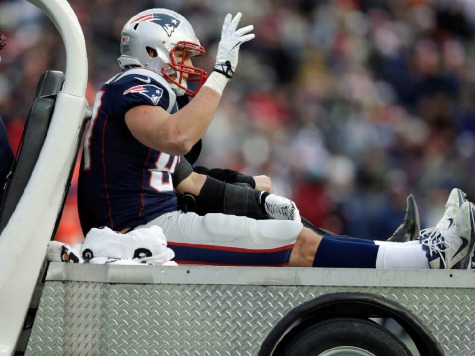
“It has been brought out many times already that injuries are more frequent in the open plays than in the so-called close formations,” football founding father Walter Camp maintained in 1905. Nevertheless, rules makers opened up the game through the introduction of the forward pass, the neutral zone, ten-yard intervals for gaining new downs, and other reforms after the tumultuous 1905 season. The sport’s body count rose from 18 in 1905 to 27 as a result of the 1909 season.
The open game that Camp dreaded made his grinding game more exciting. It didn’t make it safer. In football legislation, as in governmental legislation, outcomes don’t always match intents.
New England Patriots tight end Rob Gronkowski’s season-ending MCL and ACL tears on a low hit by Browns safety T.J. Ward reminds us of this truism.
“It was a decision I made just to make a tackle on a big man and unfortunately he got hurt,” Ward explained after Sunday’s game. “But if I would’ve hit up high, there’s a chance I would get fined and all that other stuff. I’m just being safe.” The knee injury occurred on a 21-yard reception in the third quarter during New England’s come-from-behind victory.
Making helmet-to-helmet hits taboo and moving up kickoffs have resulted in a decline in NFL concussions from 266 in 2011 to 171 in 2012. Thus far, injury reports list 114 concussions for 2013, suggesting the trend line continues on a downward trajectory.
But defensive players have to stop ball carriers somehow, and penalties and fines on high hits make low hits a more attractive option. The new dangers wrought by recent reforms were highlighted in the preseason, when Texans safety D.J. Swearinger aimed low on Dolphins tight end Dustin Keller, who tore his ACL, MCL, and PCL on the play. Many, including T.J. Ward, reason that the drive to make the game safer has in some respects made it more dangerous.
“We have to play the game the way they want it played,” Ward reasoned. “I [have] been fined three times. I don’t like to play for free. Repeat offenders they’re starting to suspend. It’s not a decision where I’ll go low on every play, but actually it’s turned into that. If you hit him in the chest and he lowers his head, I got a chance to be fined. When they set the rule, everyone knew what was going to happen. It’s pretty much inevitable.”
Indeed, Ward predicted injuries like the one Gronkowski suffered two months ago after fellow Browns defensive back Taushaun Gipson knocked Buffalo Bills rookie quarterback E.J. Manuel out of competition with a low hit. “It’s going to happen and it’s going to continue to happen,” Ward then insisted to the Cleveland Plain Dealer of the knee and leg injuries. “That’s how the rules have forced us to change. If you aim at the torso guys start ducking. So to avoid that because guys duck, you have to aim even lower.”
While head injuries garner headlines, they rank among the most infrequent sports injuries. When doctors at Boston’s Children’s Hospital chronicled every visit from young athletes in the first decade of the twenty-first century, they discovered that just 1.5 percent of visitors sought treatment for a head injury, which included concussions. Almost 99 percent of sports injuries afflicted young athletes from the neck down. Concussions didn’t even make the top-ten list of athletic maladies. About sixty percent of sports injuries occurred below the waist. Perhaps as surprising, soccer, not football, accounted for most of the hospital visits.
Despite weeks of NFL football left, 2013’s season-ending ACL injuries have already eclipsed the number of such injuries during the 2012 and 2011 seasons. It doesn’t take a football genius like Walter Camp to understand the inevitability of this unwanted outcome. T.J. Ward grasped it. And now Rob Gronkowski, a man called “big meathead” by teammates, surely does too.
Daniel J. Flynn is the author of The War on Football: Saving America’s Game (Regnery, 2013).

COMMENTS
Please let us know if you're having issues with commenting.